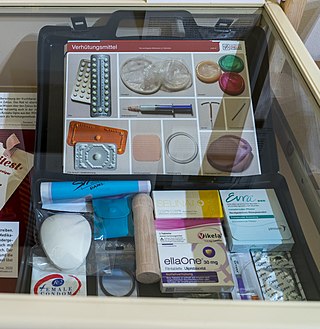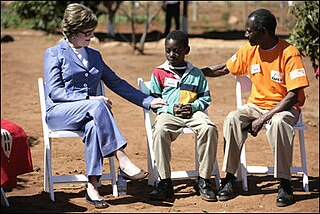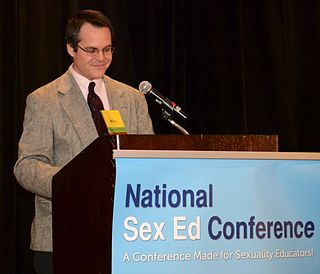Related Research Articles

Sex education, also known as sexual education, sexualityeducation or sex ed, is the instruction of issues relating to human sexuality, including human sexual anatomy, sexual activity, sexual reproduction, safe sex and birth control, sexual health, reproductive health, emotional relations and responsibilities, age of consent, and reproductive rights. Sex education which includes all of these issues is known as comprehensive sex education, and is often opposed to abstinence-only sex education, which only focuses on sexual abstinence. Sex education may be provided as part of school programs, public health campaigns, or by parents or caregivers. In some countries it is known as "Relationships and Sexual Health Education".
The sex-positive movement is a social and philosophical movement that seeks to change cultural attitudes and norms around sexuality, promoting the recognition of sexuality as a natural and healthy part of the human experience and emphasizing the importance of personal sovereignty, safer sex practices, and consensual sex. It covers every aspect of sexual identity including gender expression, orientation, relationship to the body, relationship-style choice, and reproductive rights. Sex-positivity is "an attitude towards human sexuality that regards all consensual sexual activities as fundamentally healthy and pleasurable, encouraging sexual pleasure and experimentation." It challenges societal taboos and aims to promote healthy and consensual sexual activities. The sex-positive movement also advocates for comprehensive sex education and safe sex as part of its campaign. The movement generally makes no moral distinctions among types of sexual activities, regarding these choices as matters of personal preference.
CPS or cps may refer to:

Bareback sex is physical sexual activity, especially sexual penetration, without the use of a condom. The topic primarily concerns anal sex between men without the use of a condom, and may be distinguished from unprotected sex because bareback sex denotes the deliberate act of forgoing condom use.

The Masturbate-a-thon is an event in which participants masturbate to raise money for charity and increase the public awareness and dispel the shame and taboos that exist about this form of sexual activity. From 1998 to 2003, the Masturbate-a-thon raised around $25,000 for women's health initiatives and HIV prevention, education and treatment organizations, and has contributed to debates about safer sex and alternative safe methods of sexual expression. The event awards several honors for those who raise the most money as well as for multiple orgasms and endurance.

Abstinence-only sex education is a form of sex education that teaches not having sex outside of marriage. It often excludes other types of sexual and reproductive health education, such as birth control and safe sex. Comprehensive sex education, by contrast, covers the use of birth control and sexual abstinence.
Comprehensive sexuality education (CSE) is a sex education instruction method based on a curriculum that aims to give students the knowledge, attitudes, skills, and values to make appropriate and healthy choices in their sexual lives. The intention is that this understanding will prevent students from contracting sexually transmitted infections, such as HIV and HPV. CSE is also designed with the intention of reducing unplanned and unwanted pregnancies, as well as lowering rates of domestic and sexual violence, thus contributing to a healthier society, both physically and mentally.
Adolescent sexuality is a stage of human development in which adolescents experience and explore sexual feelings. Interest in sexuality intensifies during the onset of puberty, and sexuality is often a vital aspect of teenagers' lives. Sexual interest may be expressed in a number of ways, such as flirting, kissing, masturbation, or having sex with a partner. Sexual interest among adolescents, as among adults, can vary greatly, and is influenced by cultural norms and mores, sex education, as well as comprehensive sexuality education provided, sexual orientation, and social controls such as age-of-consent laws.

The questioning of one's sexual orientation, sexual identity, gender, or all three is a process of exploration by people who may be unsure, still exploring, or concerned about applying a social label to themselves for various reasons. The letter "Q" is sometimes added to the end of the acronym LGBT ; the "Q" can refer to either queer or questioning.

William J. Taverner, MA, commonly known as Bill Taverner, is the editor of the American Journal of Sexuality Education and the executive director of the Center for Sex Education (CSE). He has co-authored numerous sexuality education manuals, including All Together Now: Teaching about Contraception and Safer Sex, Making Sense of Abstinence: Lessons for Comprehensive Sex Education, Positive Images: Teaching Abstinence, Contraception, and Sexual Health,Streetwise to Sex-Wise: Sexuality Education for High-Risk Youth, and Older, Wiser, Sexually Smarter.
Advocates for Youth is a nonprofit organization and advocacy group based in Washington, D.C., United States, dedicated to sexuality education, the prevention of HIV and of sexually transmitted disease, teenage pregnancy prevention, youth access to condoms and contraception, equality for LGBT youth, and youth participation. In addition, Advocates for Youth sponsors media campaigns and other forms of outreach which attempt to change societal norms to be more understanding of, accepting, of, and responsible about youth sexuality and to drive youth sexual health equity.

Avert is an international charity that uses digital communications to increase health literacy on HIV and sexual health, among those most affected in areas of greatest need, in order to reduce new infections and improve health and well-being.

Sexuality and disability is a topic regarding the sexual behavior and practices of people with disabilities. Like the general population, these individuals exhibit a wide range of sexual desires and adopt diverse methods of expressing their sexuality. It is a widespread concern, however, that many people with disabilities do not receive comprehensive sex education, which could otherwise positively contribute to their sexual lives. This roots from the idea that people with disabilities are asexual in nature and are not sexually active. Although some people with disabilities identify as asexual, generalizing this label to all such individuals is a misconception. Many people with disabilities lack rights and privileges that would enable them to have intimacy and relationships. When it comes to sexuality and disability there is a sexual discourse that surrounds it. The intersection of sexuality and disability is often associated with victimization, abuse, and purity.
Research has found that attempted suicide rates and suicidal ideation among lesbian, gay, bisexual, transgender (LGBT) youth are significantly higher than among the general population.
In the United States, sex education is taught in two main forms: comprehensive sex education and abstinence-only as part of the Adolescent Family Life Act, or AFLA. Comprehensive sex education is also called abstinence-based, abstinence-plus, abstinence-plus-risk-reduction, and sexual risk reduction sex education. This approach covers abstinence as a choice option, but also informs adolescents about age of consent and the availability of contraception and techniques to avoid contraction of sexually transmitted infections. Every state within the U.S. has a mandated AIDS Education Program.

LGBT sex education is a sex education program within a school, university, or community center that addresses prominent sexual health topics among LGBT groups. Within schools, topics on LGBT sexual health are usually integrated into the general sex education courses.
A Sex education curriculum is a sex education program encompassing the methods, materials, and assessments exercised to inform individuals of the issues relating to human sexuality, including human sexual anatomy, sexual reproduction, sexual intercourse, reproductive health, emotional relations, reproductive rights and responsibilities, abstinence, birth control, and other aspects of human sexual behavior.
Reach A Hand, Uganda (RAHU) is a youth serving nonprofit organisation based in Uganda that focuses on youth empowerment programs with an emphasis on, Sexual Reproductive Health Rights (SRHR) and Advocacy of young people between the ages of 10–30 years including HIV/AIDS awareness and prevention ,youth livelihood promotion. RAHU works with the goal of increasing access to information and services relating to SRHR for young people so as to empower them live healthy, focused and productive lives. Reach A Hand Uganda's efforts are timely to make a contribution to ensuring that every young person in Uganda can access accurate information to aid and direct them in taking that crucial life decision regarding their life skills and development, and sexual reproductive health and rights.

The health access and health vulnerabilities experienced by the lesbian, gay, bisexual, transgender, queer or questioning, intersex, asexual (LGBTQIA) community in South Korea are influenced by the state's continuous failure to pass anti-discrimination laws that prohibit discrimination based on sexual orientation and gender identity. The construction and reinforcement of the South Korean national subject, "kungmin," and the basis of Confucianism and Christianity perpetuates heteronormativity, homophobia, discrimination, and harassment towards the LGBTQI community. The minority stress model can be used to explain the consequences of daily social stressors, like prejudice and discrimination, that sexual minorities face that result in a hostile social environment. Exposure to a hostile environment can lead to health disparities within the LGBTQI community, like higher rates of depression, suicide, suicide ideation, and health risk behavior. Korean public opinion and acceptance of the LGBTQI community have improved over the past two decades, but change has been slow, considering the increased opposition from Christian activist groups. In South Korea, obstacles to LGBTQI healthcare are characterized by discrimination, a lack of medical professionals and medical facilities trained to care for LGBTQI individuals, a lack of legal protection and regulation from governmental entities, and the lack of medical care coverage to provide for the health care needs of LGBTQI individuals. The presence of Korean LGBTQI organizations is a response to the lack of access to healthcare and human rights protection in South Korea. It is also important to note that research that focuses on Korean LGBTQI health access and vulnerabilities is limited in quantity and quality as pushback from the public and government continues.